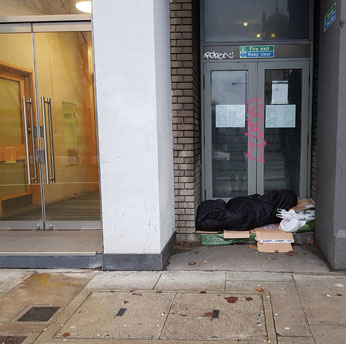Rough sleeping is often associated with nuisance activities such as begging, street drinking and anti-social behaviour. Homelessness is a complex issue and entrenched homelessness presents particular difficulties; addictions and criminal and offending behaviour may be a symptom, and a cause, of homelessness. So says the opening of a Rough Sleepers: Enforcement Powers (England) research briefing document, by the House of Commons Library. It goes over what police and local authorities can do to tackle rough sleeping, while, as the document points out, such powers may be criticised for criminalising rough sleeping by the homeless.
The document goes through how others – businesses, security companies, planners – may seek to deter rough sleepers:
Physical deterrents (or referred to as ‘defensive architecture’): street furniture may include features such as spikes, curved or segregated benches, and gated doorways, to deter rough sleeping;
‘Wetting down’: – spraying and hosing down doorways/alleyways with water or cleaning products to stop rough sleepers using the space;
Noise pollution: sounds, such as loud music, are projected through speakers to deter rough sleepers;
Moving-on: security guards/enforcement agencies tell rough sleepers to move out of an area;
Diverted giving schemes: local authority sanctioned schemes that promote and advertise in begging hotspots asking members of the public to reconsider giving money to beggars and give to local charities instead.
These measures do not incur legal penalties or sanctions but their use is controversial, the document points out.
More formally, local government has various powers, that the paper details: such as Public Spaces Protection Orders (PSPOs), dispersal powers, civil injunctions and Criminal Behaviour Orders (CBOs).
The document sets out views of homelessness charities and the civil rights body Liberty, that criminalising rough sleepers is cruel; and enforcement activity in one area simply displaces on-street sleeping and begging to another area and may mean that rough sleepers are forced to move away from support services.
To download the nine-page document visit https://commonslibrary.parliament.uk/research-briefings/cbp-7836/.
In February homelessness charity Crisis welcomed a signal from housing minister Robert Jenrick that the 1824 Vagrancy Act would be done away with.
Photo by Mark Rowe; rough sleeper, morning, Euston Road, London, December 2020.










